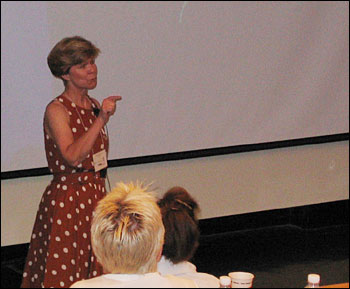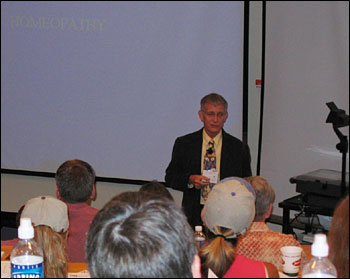The first-ever Breeders Symposium, held on Saturday, July 17, 2004 in Raleigh, N. C. provided attendees with the golden opportunity to learn how to breed better dogs as well as gather the most current information available for improving canine health through advances in veterinary medicine.
Jointly sponsored by the American Kennel Club and the Canine Health Foundation and hosted by the North Carolina State University School of Veterinary Medicine, the day’s very timely topics ranged from the basic genetics of dog breeding and canine reproduction to the status of the dog genome project to the latest in vaccination guidelines with discussions by recognized experts in complementary and alternative medicine for dogs as well as cancer, neological disease and atopic dermatitis.
Close to one hundred breeders, veterinarians, veterinary technicians and concerned dog owners took advantage of this inaugural opportunity to increase their knowledge and network with like-minded people to work toward improving the health of their dogs.
Upon arrival, attendees were given a tote bag from the Canine Health Foundation filled with literature from the Canine Health Foundation and the American Kennel Club and a binder containing brief summaries of the topics to be presented. Breakfast pastries, muffins, fruit and beverages were enjoyed as Matthew Breen, PhD of N. C. State University, Walter Goodman of the AKC Board of Directors and Erika Werne, Grants Director of the Canine Health Foundation welcomed everyone.
The keynote speaker was Claudia Orlandi, PhD, popular AKC judge, breeder and exhibitor, who lectured from her book, The ABCs of Dog Breeding: What Every Dog Breeder Should Know. Dr. Orlandi’s book can also be used as a home study guide for helping breeders to improve their breeding programs and will be available on the AKC website in the near future.
Next Katherine Settle, DVM, spoke on canine reproduction, discussing such topics as preparation for breeding, the right time to breed, methods for breeding, gestation and whelping.
An overview of the modalities of complementary and alternative medicine was presented by Robert G. Schaeffer, Jr., DVM, PhD, including such things as acupuncture, spinal manipulative therapy (chiropracty), Chinese and Western herbal medicine, homeopathy and orthomolecular medicine.
A brief update on American Kennel Club matters deemed of interest to the attendees was presented by Debra Bonnefond, Director of the American Kennel Club’s Veterinary Outreach department prior to lunch, which was provided to the participants.
After lunch, Erika Werne, Director of Grants, Canine Health Foundation, updated the group on the latest from the Canine Health Foundation, including calling attention to the list of latest grants approved by the CHF found in the handouts.
Natasha Olby, VetMB, PhD, presented information on certain types of canine cancer being studied and treated at the NCSU College of Veterinary Medicine and then Matthew Breen, PhD, C.Biol, M.I.Biol, gave an exciting status report on the Canine Genome Sequence, informing the group that the sequence had just been made public on the National Center for Biotechnology Information website at http://www.ncbi.nlm.nih.gov/genome/guide/dog/.
Next Bruce Hammerberg, DVM, PhD, presented information on atopic dermatology and Dr. Olby again gave an overview on canine neurological disease and its effects on breeding.
Finally Richard Ford, DVM, MS, presented the latest information available on that ever-controversial topic, canine vaccinations and provided a website for more information on the subject, www.dvmvac.com.
Participants left the symposium feeling very well-informed about the latest in breeding and canine health, thanks to North Carolina State University, the American Kennel Club and the Canine Health Foundation.






